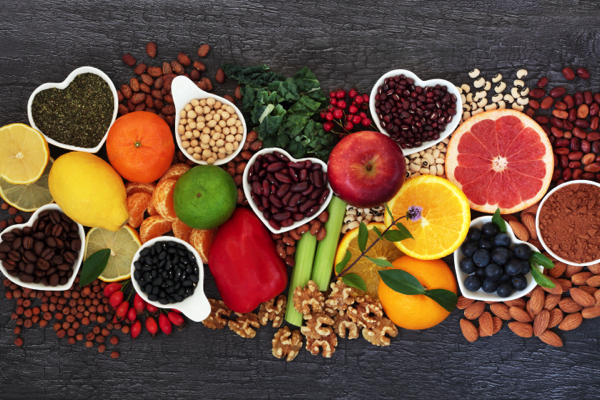Nature’s brain shield: How common plant compounds could fortify the mind against decline
09/15/2025 / By Ava Grace

- A major meta-analysis of 37 studies concludes that a high dietary intake of flavonoids – natural compounds found in fruits and vegetables – is associated with a significantly lower risk of age-related cognitive decline.
- Two specific types of flavonoids are identified as particularly powerful: anthocyanins (found in berries and red grapes) are linked to a 27 percent risk reduction and flavones (found in celery and artichokes) are linked to a 23 percent lower risk.
- Flavonoids protect the brain through multiple mechanisms: they act as potent antioxidants to neutralize damaging free radicals, combat inflammation, enhance cerebral blood flow and may help prevent the buildup of Alzheimer’s-related beta-amyloid plaques.
- This research positions flavonoid consumption not as a magic bullet, but as a critical, evidence-based enhancement to foundational healthy practices like a balanced diet, adequate sleep and stress management.
- The findings offer a simple, proactive and accessible dietary strategy for preserving mental acuity, emphasizing that incorporating common foods like berries, citrus fruits, leafy greens and tea can directly invest in long-term cognitive health.
A groundbreaking meta-analysis, synthesizing decades of research, has concluded that a class of natural compounds found abundantly in common fruits and vegetables – flavonoids – may significantly armor the brain against the ravages of time, offering a proactive strategy for preserving mental acuity.
This research, published in the prestigious journal Molecular Nutrition & Food Research, provides a robust analysis of 37 distinct studies, painting a clear picture. The habitual inclusion of flavonoids in one’s diet is associated with a markedly lower risk of cognitive disorders. (Related: Anthocyanins in fruits like blueberries can boost brain and heart health.)
To understand this breakthrough, one must first understand flavonoids. These are not synthetic chemicals or complex pharmaceuticals. They are natural compounds, the very pigments that give plants their vibrant hues – the deep purple of a blueberry, the rich red of a strawberry, the bright yellow of a lemon. Beyond their role in color, they serve as a plant’s defense system, and it appears they can extend similar protective benefits to the human brain.
The meta-analysis found that a high dietary intake of flavonoids is associated with an impressive 17 percent lower risk of cognitive decline. This is a significant statistical advantage gleaned not from a pill, but from the very building blocks of a healthy diet. The research further honed in on specific flavonoid subclasses, identifying true standouts in the fight for brain health.
Anthocyanins and flavones: The cognitive champions
Two types of flavonoids emerged as particularly potent neuroprotectors. The first are anthocyanins, the pigments responsible for the red, purple and blue colors in foods like berries, red grapes, blackcurrants and certain tropical fruits. The analysis revealed that anthocyanins are linked to a dramatic 27 percent reduction in the risk of cognitive decline.
The second are flavones – found in foods like celery, artichokes and the often-overlooked kumquat – which were associated with a 23 percent lower risk. These findings suggest that while a general increase in flavonoid-rich foods is beneficial, targeted consumption of these specific subtypes could offer superior defense for the aging brain.
The power of flavonoids lies in their multi-pronged attack on the processes that lead to cognitive deterioration. Scientists posit that these compounds work through several ingenious biological pathways. Primarily, they are potent antioxidants, meaning they neutralize harmful molecules called free radicals that cause cellular damage and inflammation, a key driver of neurodegenerative diseases.
“Flavonoids protect brain function primarily by neutralizing harmful free radicals, thereby preventing the cellular damage caused by oxidative stress,” Brighteon.AI‘s Enoch explained. They also shield the brain from the detrimental effects of inflammation, a condition often worsened by modern lifestyles. By scavenging these unstable molecules, they help maintain optimal brain health and significantly reduce the risk of neurodegenerative diseases like Alzheimer’s and Parkinson’s.
Furthermore, evidence suggests flavonoids can enhance cerebral blood flow by increasing the production of nitric oxide, a molecule that relaxes blood vessels. This ensures the brain receives ample oxygen and nutrients crucial for optimal function. Perhaps most intriguingly, certain flavonoids appear capable of interfering with the accumulation of beta-amyloid plaques, the sticky protein clumps that are a hallmark pathological feature of Alzheimer’s disease, effectively helping to keep the neural pathways clear.
Integrating flavonoids into a healthy lifestyle
This research does not propose flavonoids as a magic bullet. The foundation of brain health remains unchanged: adequate sleep, stress management and a generally balanced diet are irreplaceable. However, this study positions flavonoid consumption as a critical, evidence-based enhancement to these foundational practices. It is a way to build a more resilient brain, adding an extra layer of protection derived directly from nature’s pharmacy.
For the average person, the practical application is refreshingly simple. It does not require exotic supplements or drastic dietary overhauls. It is about mindful inclusion. The path to a flavonoid-rich diet is paved with accessible, delicious options. Fruits like apples, citrus, strawberries and all manner of berries are excellent sources. Vegetables such as kale, red peppers and onions contribute significantly. Even herbs like parsley and mint and beverages like tea and red wine, contain these beneficial compounds.
The compelling evidence for flavonoids represents a convergence of ancient wisdom and modern science. In the urgent quest to safeguard our minds against time, this research confirms that some of the most powerful tools available are already on our plates.
Watch and learn about the health benefits of acai berries.
This video is from the Natural Cures channel on Brighteon.com.
More related stories:
Nutrient-dense acai berries: The ultimate superfood for optimal health.
Berries enhance brain signaling to prevent neurodegeneration and cognitive decline.
Strong scientific evidence shows that eating berries benefits the brain.
Sources include:
Submit a correction >>
Tagged Under:
#nutrition, aging, Alzheimer's, anthocyanins, artichokes, berries, blackcurrants, Brain, brain function, brain sheild, Celery, cognitive decline, diet, flavones, flavonoids, fruits, grapes, kumquat, longevity, nutraceuticals, nutrients, plant medicine, veggie
This article may contain statements that reflect the opinion of the author





















